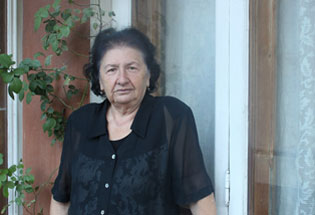„It Is a Good Initiative to Include Bagrat Shunkuba’s “Last Ubykh” in School Curriculum”

States the Translator of Famous Saga of Abkhazian classic Tamar Chijavadze
Salome Achba
Under the framework of Sorry Campaign Human Rights Center plans to publish a novel by Abkhazian writer Bagrat Shinkuba “Last Ubykh”. New books will be good gift both for Georgian and Abkhazian readers.
Moreover, the electronic version of Last Ubykh will be downloaded on multilingual site www.apsni.org. Human Rights Center addresses the Ministry of Education to include the “Last Ubykh” in Georgian school curriculum.
“Last Ubykh” is a novel of Abkhazian classic Bagrat Shinkuba. The book is dedicated to the tragedy of Abkhazian and other Caucasian people, the so-called muhajir journey, the tragic journey of muhajirs who were resettled in Turkey.
Muhajir journey is not the tragedy of just Abkhazians, but Georgians as well since there were hundreds of Georgians among the people resettled to Turkey. Besides, in Turkey muhajirs were met by those Georgians who lived in historical Georgian villages taken by the Osmal Empire. One of the main characters of Bagrat Shinkuba’s novel is a Georgian blacksmith Davit who is a brother under vow of last ubykh.
Before Georgian-Abkhazian conflict Bagrat Shinkuba had friendly relationship with Georgian writers. Grigol Abashidze, Nika Agiashvili, Rezo Margiani, Shota Nishnianidze and other famous Georgian writers translated his novels. The novel Last Ubykh was translated by Shota Nishnianidze’s wife Tamar Chijavadze.
Last Ubykh translated by Tamar Chijavadze was published twice by the publishing house Merani in the 80ies of the past year. Despite the fact that the book was published under rather big edition, it is rare to find it in the bookstores nowadays.
The translator of Last Ubykh Tamar Chijavadze talked to Human Rights Center about the artistic value of the novel, the characteristics of the author and his friendship with Georgian writers. We would like to offer an interview with her.
- Mrs. Tamar, can you recall the time when Georgian and Abkhazian writers had friendly relationships? How was the issue of translation of Last Ubykh in Georgian decided?
- The author of the book Bagrat Shinkuba was friends with Shota. He asked Shota to translate Last Ubykh in Georginan but Shota always abstained from translating a prose. Finally, it was decided that I would translate this novel. I really like the book and started translating. I often contacted Mr. Bagrat during the process of translation and he used to help me. At first the translation was published in the magazine Mnatobi in parts. Then we published it as a book. Bagrat was very satisfied with the translation. He always thanked me when he contacted me. As I know he expected the Georgians to make the film based on this novel and was very sad that it did not work out. The plot is so interesting that the film would have been really interesting.
- What was the impression of Georgian reader on the novel of Abkhazian writer?
- As I told you, initially the Last Ubykh was published in the magazine Mnatobi in parts. The head of prose department of the magazine used to tell me that the readers were impatient for the next edition of the magazine because of this novel. After publishing the book, the whole edition was soon sold out.
- As a translator, how would you evaluate the artistic value of the book?
- Shinkuba is a classic writer of Abkhazians. I have often heard from Abkhazians that if a writer like Shinkuba is born once in every thousand years, Abkhaz nation can endure centuries. I think Last Ubykh is an interesting novel and has a high artistic value. This book is also interesting in a way that author clearly demonstrates the muhajir journey of Caucasian people and empathetically notes that Russia played a huge negative role in it. I am always surprised how Abkhazian people can have positive attitude towards Russians after what they did to Abkhazians regarding muhajir journey.
- What kind of relationship did Shinkuba have with Georgian writers?
- Lately, Bagrat had warmer relationships with Russians. Shota did not like this and told him once – what did he want in whale’s hands. He replied – it is better to be swallowed by a bigger whale than by a smaller. He implied Georgia in the smaller whale. I was very sorry for this phrase. My family had close friendly ties with Abkhazian writers and I knew that they did not have negative feelings towards Georgians. When I heard these words I was very surprised. When the war started, we all were very surprised. You could not see from our relationship that the war was feasible between these two people.
Every time we went to Sokhumi, Bagrat Shinkuba hosted us splendidly. I remember once when we were coming back to Tbilisi from Sokhumi Mr. Bagrat saw us off and gave us some wine. He was rather old by that time. He put the box on the shoulders and carried it till the train station. Shota tried to get the box but he refused. In this way Mr. Bagrat expressed his respect to us. This respect was not just directed to Shota Nishnianidze. He respected whole Georgian nation. Bagrat often came to Tbilisi. He had graduated from university here and had many friends.
- Did these relationships continue after the war?
- These relationships ended after the war.
- Human Rights Center is going to address the Ministry of Education to include Bagrat Shinkuba’s Last Ubykh in the school curriculum. What do you think about it?
- I think this is a good and interesting initiative. This would be a significant step to analyze Georgian-Abkhazian as well as Russian-Abkhazian relationships. If this happens and Last Ubykh is added to the school program, Georgian students will find out more about the Caucasian people – including Abkhazians. This can at least fill in the information vacuum not to talk about other positive results.



